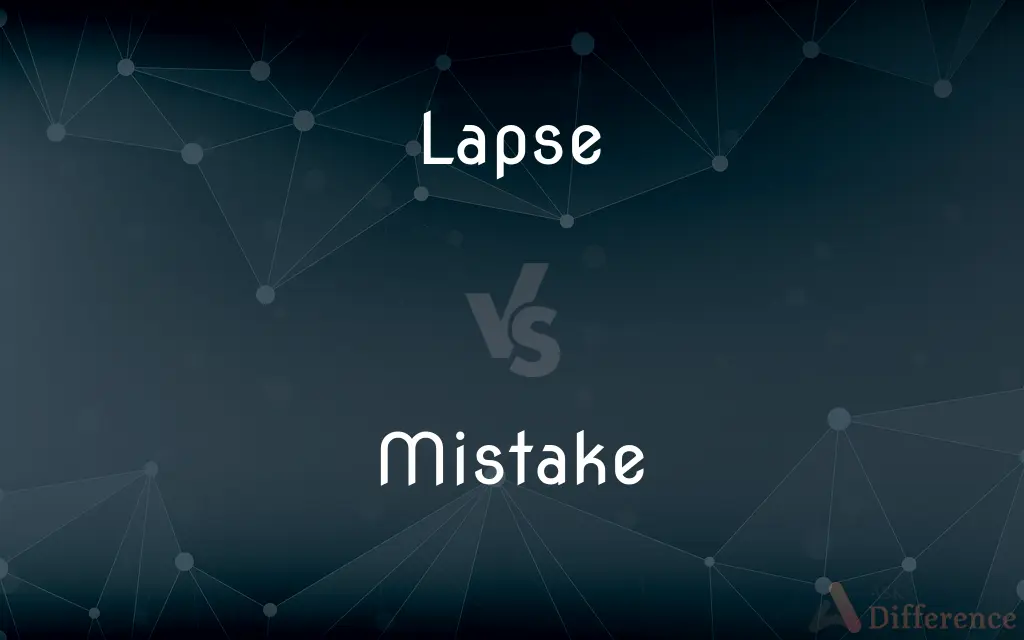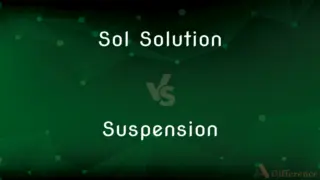Lapse vs. Mistake — What's the Difference?
By Maham Liaqat & Fiza Rafique — Updated on April 8, 2024
A lapse is a temporary failure or slip in judgment, while a mistake is a broader term for any incorrect action or decision. Lapse emphasizes temporariness and often unintentionality, whereas mistakes can be any error, regardless of intent or duration.

Difference Between Lapse and Mistake
Table of Contents
ADVERTISEMENT
Key Differences
A lapse is specifically a minor and often temporary deviation from what is moral, acceptable, or correct, typically due to a lack of judgment or momentary forgetfulness. It suggests a slip or minor error rather than a deliberate wrongdoing. Whereas a mistake can refer to any incorrect action, decision, or judgment, resulting from misinterpretation, lack of knowledge, carelessness, or misjudgment, regardless of the intent behind the error.
Lapses are often seen in the context of behavior or performance, such as forgetting an appointment or momentarily losing focus during a task. These incidents are usually brief and can be corrected or overcome with relative ease. On the other hand, mistakes can range from simple errors in calculation to significant blunders in decision-making, which may have more substantial consequences and require more effort to rectify.
In terms of intentionality, lapses are generally not premeditated; they happen because of a momentary break in concentration or discipline. This aspect highlights their temporary nature and suggests that they are less severe than many mistakes, which can be either intentional or unintentional but are often perceived as more significant errors due to their impact or the awareness of the incorrect action.
The concept of recovery also differs between the two; lapses, by their nature, suggest a quicker and less complicated recovery process because they are typically minor and short-lived. Mistakes, depending on their severity and the context in which they occur, might require a more complex process of acknowledgment, learning, and correction to overcome.
The societal and personal perceptions of lapses versus mistakes can vary significantly. A lapse, especially if it is recognized and corrected quickly, may be more readily forgiven or overlooked, seen as a human error. Mistakes, particularly those with lasting consequences or those arising from negligence, are often judged more harshly, both by others and by oneself, potentially leading to more significant feelings of regret or guilt.
ADVERTISEMENT
Comparison Chart
Definition
A temporary deviation from expected behavior or performance.
An incorrect action or decision due to misunderstanding or carelessness.
Intent
Generally unintentional, due to momentary inattention or forgetfulness.
Can be unintentional or intentional, not limited by awareness.
Duration and Recovery
Typically short-lived with quick recovery.
Can have long-term consequences and require significant correction.
Context
Often related to behavior or performance errors.
Broad, including errors in judgment, action, or belief.
Perceptions
Seen as minor and forgivable; often due to human error.
Judged based on severity and impact; can lead to guilt or regret.
Compare with Definitions
Lapse
A brief return to previous behavior, especially in the context of addiction.
His lapse into old habits disappointed everyone.
Mistake
A miscalculation or erroneous conclusion.
His mistake in the financial report led to an overestimate of profits.
Lapse
A temporary failure of concentration, memory, or judgment.
Forgetting a close friend's birthday was an embarrassing lapse.
Mistake
An error in understanding or perception.
Mistaking politeness for friendship is common.
Lapse
A cessation or pause.
There was a brief lapse in the conversation.
Mistake
An action or judgment that is misguided or wrong.
Sending the email to the wrong person was a mistake.
Lapse
A short or temporary slip in conduct or attention.
A momentary lapse in the musician's performance went unnoticed by most.
Mistake
An error in action, calculation, opinion, or judgment caused by poor reasoning, carelessness, or insufficient knowledge.
The scientist admitted a mistake in his research.
Lapse
A period of time passing.
After a lapse of several years, they finally reconnected.
Mistake
An act or judgement that is misguided or wrong
She made the mistake of thinking they were important
Coming here was a mistake
Lapse
A brief or temporary failure of concentration, memory, or judgement
A lapse of concentration in the second set cost her the match
Mistake
Be wrong about
Because I was inexperienced I mistook the nature of our relationship
Lapse
An interval or passage of time
There was a considerable lapse of time between the two events
Mistake
An error or fault resulting from defective judgment, deficient knowledge, or carelessness.
Lapse
(of a right, privilege, or agreement) become invalid because it is not used, claimed, or renewed; expire
He let his membership of CND lapse
Mistake
A misconception or misunderstanding.
Lapse
Pass gradually into (an inferior state or condition)
The country has lapsed into chaos
Mistake
To understand wrongly; misinterpret
Mistook my politeness for friendliness.
Lapse
To fall from a previous level or standard, as of accomplishment, quality, or conduct
Lapse into bad habits.
A team that lapsed into mediocrity halfway through the season.
Mistake
To recognize or identify incorrectly
He mistook her for her sister.
Lapse
To deviate from a prescribed or accepted way
Lapse into heresy.
Mistake
To make a mistake; err.
Lapse
To pass gradually or smoothly; slip
Lapse into reverie.
Mistake
(transitive) To understand wrongly, taking one thing or person for another.
Sorry, I mistook you for my brother. You look very similar.
Don't mistake my kindness for weakness.
Lapse
To come to an end, especially gradually or temporarily
He realized that his attention had lapsed and he hadn't heard the assignment.
Mistake
To misunderstand (someone).
Lapse
To be no longer valid or active; expire
She allowed her membership to lapse after the first year.
Mistake
To commit an unintentional error; to do or think something wrong.
Lapse
(Law) To cease to be available as a result of expiration, disuse, or impossibility. Used of a right or privilege.
Mistake
To take or choose wrongly.
Lapse
To go by; elapse
Years had lapsed since we last met.
Mistake
An error; a blunder.
There were too many mistakes in the test, that unfortunately you failed.
Lapse
To allow to lapse.
Mistake
(baseball) A pitch which was intended to be pitched in a hard-to-hit location, but instead ends up in an easy-to-hit place.
Lapse
A usually minor or temporary failure; a slip
A lapse of memory.
A lapse in judgment.
Mistake
To take or choose wrongly.
Lapse
A deterioration or decline
A lapse into barbarism.
Mistake
To take in a wrong sense; to misunderstand misapprehend, or misconceive; as, to mistake a remark; to mistake one's meaning.
My father's purposes have been mistook.
Lapse
A moral fall
A lapse from grace.
Mistake
To substitute in thought or perception; as, to mistake one person for another.
A man may mistake the love of virtue for the practice of it.
Lapse
A break in continuity; a pause
A lapse in the conversation.
Mistake
To have a wrong idea of in respect of character, qualities, etc.; to misjudge.
Mistake me not so much,To think my poverty is treacherous.
Lapse
A period of time; an interval
A lapse of several years between the two revolutions.
Mistake
To err in knowledge, perception, opinion, or judgment; to commit an unintentional error.
Servants mistake, and sometimes occasion misunderstanding among friends.
Lapse
(Law) The termination of a right or privilege as a result of expiration, disuse, or impossibility.
Mistake
An apprehending wrongly; a misconception; a misunderstanding; a fault in opinion or judgment; an unintentional error of conduct.
Infallibility is an absolute security of the understanding from all possibility of mistake.
Lapse
A temporary failure; a slip.
Memory lapse
Lapse of judgment
Lapse in security
Lapse in concentration
Mistake
Misconception, error, which when non-negligent may be ground for rescinding a contract, or for refusing to perform it.
Lapse
A decline or fall in standards.
Mistake
A wrong action attributable to bad judgment or ignorance or inattention;
He made a bad mistake
She was quick to point out my errors
I could understand his English in spite of his grammatical faults
Lapse
A pause in continuity.
Mistake
An understanding of something that is not correct;
He wasn't going to admit his mistake
Make no mistake about his intentions
There must be some misunderstanding--I don't have a sister
Lapse
An interval of time between events.
Mistake
Part of a statement that is not correct;
The book was full of errors
Lapse
A termination of a right etc., through disuse or neglect.
Mistake
Identify incorrectly;
Don't mistake her for her twin sister
Lapse
(meteorology) A marked decrease in air temperature with increasing altitude because the ground is warmer than the surrounding air.
Mistake
To make a mistake or be incorrect
Lapse
(legal) A common-law rule that if the person to whom property is willed were to die before the testator, then the gift would be ineffective.
Lapse
(theology) A fall or apostasy.
Lapse
(intransitive) To fall away gradually; to subside.
Lapse
(intransitive) To fall into error or heresy.
Lapse
To slip into a bad habit that one is trying to avoid.
Lapse
(intransitive) To become void.
Lapse
To fall or pass from one proprietor to another, or from the original destination, by the omission, negligence, or failure of somebody, such as a patron or legatee.
Lapse
A gliding, slipping, or gradual falling; an unobserved or imperceptible progress or passing away,; - restricted usually to immaterial things, or to figurative uses.
The lapse to indolence is soft and imperceptible.
Bacon was content to wait the lapse of long centuries for his expected revenue of fame.
Lapse
A slip; an error; a fault; a failing in duty; a slight deviation from truth or rectitude.
To guard against those lapses and failings to which our infirmities daily expose us.
Lapse
The termination of a right or privilege through neglect to exercise it within the limited time, or through failure of some contingency; hence, the devolution of a right or privilege.
Lapse
A fall or apostasy.
Lapse
To pass slowly and smoothly downward, backward, or away; to slip downward, backward, or away; to glide; - mostly restricted to figurative uses.
A tendency to lapse into the barbarity of those northern nations from whom we are descended.
Homer, in his characters of Vulcan and Thersites, has lapsed into the burlesque character.
Lapse
To slide or slip in moral conduct; to fail in duty; to fall from virtue; to deviate from rectitude; to commit a fault by inadvertence or mistake.
To lapse in fullnessIs sorer than to lie for need.
Lapse
To fall or pass from one proprietor to another, or from the original destination, by the omission, negligence, or failure of some one, as a patron, a legatee, etc.
If the archbishop shall not fill it up within six months ensuing, it lapses to the king.
Lapse
To let slip; to permit to devolve on another; to allow to pass.
An appeal may be deserted by the appellant's lapsing the term of law.
Lapse
To surprise in a fault or error; hence, to surprise or catch, as an offender.
For which, if be lapsed in this place,I shall pay dear.
Lapse
A mistake resulting from inattention
Lapse
A break or intermission in the occurrence of something;
A lapse of three weeks between letters
Lapse
A failure to maintain a higher state
Lapse
Pass into a specified state or condition;
He sank into Nirvana
Lapse
End, at least for a long time;
The correspondence lapsed
Lapse
Drop to a lower level, as in one's morals or standards
Lapse
Go back to bad behavior;
Those who recidivate are often minor criminals
Lapse
Let slip;
He lapsed his membership
Lapse
Pass by;
Three years elapsed
Common Curiosities
How can one recover from a lapse?
Recovery from a lapse typically involves recognizing the deviation and quickly correcting or addressing the temporary slip.
Can a lapse be intentional?
Lapses are generally unintentional, resulting from momentary forgetfulness or inattention rather than deliberate action.
Is forgetting an appointment a lapse or a mistake?
Forgetting an appointment is considered a lapse, as it is a temporary failure of memory or concentration.
What is a lapse?
A lapse is a temporary and often minor deviation from expected behavior, performance, or memory, typically due to a brief failure in concentration or judgment.
Is every error a mistake?
Yes, in a broad sense, every error can be considered a mistake, encompassing incorrect actions, judgments, or decisions.
What constitutes a mistake?
A mistake is any incorrect action, decision, or judgment that arises from misinterpretation, lack of knowledge, carelessness, or misjudgment.
Are all mistakes due to negligence?
Not all mistakes stem from negligence; they can also result from misunderstandings, lack of information, or errors in judgment.
What is the difference between a lapse and a mistake in terms of consequences?
Lapses usually have minor, short-lived consequences, while mistakes can have more significant, long-term impacts.
How do societal perceptions of lapses and mistakes differ?
Society often views lapses as minor and more forgivable than mistakes, which can be judged harshly depending on their impact.
Can mistakes be corrected?
Yes, mistakes can be corrected, though the process may involve acknowledging the error, understanding its cause, and taking steps to rectify the situation and prevent recurrence.
How does the duration of a lapse compare to that of a mistake?
Lapses are short-lived and quickly recoverable, whereas mistakes can have enduring consequences.
What role does intent play in distinguishing a lapse from a mistake?
Intent is a key differentiator; lapses are generally unintentional, while mistakes can be either intentional or unintentional.
Can a mistake be a good learning opportunity?
Yes, mistakes often serve as valuable learning opportunities, offering insights into areas for improvement and growth.
Can lapses lead to serious consequences?
Although lapses are typically minor and temporary, certain situations can lead to more serious consequences if the lapse occurs in a critical context.
Are lapses always related to memory or concentration?
While many lapses involve memory or concentration, they can also pertain to brief deviations in behavior or performance.
Share Your Discovery

Previous Comparison
Paladin vs. Knight
Next Comparison
Walkway vs. PathwayAuthor Spotlight
Written by
Maham LiaqatCo-written by
Fiza RafiqueFiza Rafique is a skilled content writer at AskDifference.com, where she meticulously refines and enhances written pieces. Drawing from her vast editorial expertise, Fiza ensures clarity, accuracy, and precision in every article. Passionate about language, she continually seeks to elevate the quality of content for readers worldwide.















































